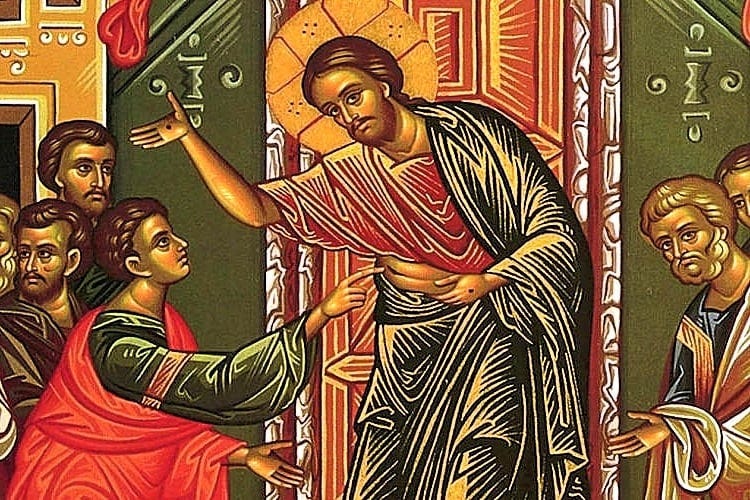
It’s right around this time each year that I’m reminded that my favorite of the Lord’s Apostles is Thomas. It’s not because the name Thomas is the patronymic origin for my own last name, which can be traced as far back in Germany as the 1250s. Instead, like Thomas, from among the twelve, I want to be the one who, even if foolishly misguided, along the way, demanded the real Jesus, the once dead but now alive Savior with scars.
I want to be bold enough in every crowd I occupy to demand that Christ do what He promised He’d do.
Still, Thomas has gained the descriptive prefix “Doubting.” Doubt is a tricky thing. Some theologians say doubt was the first sin committed in Eden. Maybe doubt is the word that describes what happened. I tend to think it was more than that. I think by the Devil’s line of questioning, he went straight for the jugular of faith, ultimately stirring absolute mistrust. “You will not surely die,” the Devil replied to Eve. “For God knows that when you eat of it your eyes will be opened, and you will be like God, knowing good and evil” (Genesis 3:4-5). This was the Devil’s way of saying, “Not only did God lie to you, but He’s hiding something from you, too.” Eve unhesitatingly believed this and went straight to dining on the fruit. Adam, who was with her, did the same (v. 6).
I could be wrong, but I think mistrust and doubt are two very different things. This reminds me of a quotation I shared in my dissertation, having first shared it during a discussion with one of the pastors participating in my doctoral research. David Mills, a former editor for Touchstone magazine, once maintained:
“In the same way, ‘permissiveness’ is a very different thing from ‘licentiousness.’ The first means relaxing the rules too much, the other means actions characterized by license and lawlessness, and usually in a lewd, lustful, and dissolute way. They are not even close to the same thing…. The ideas are related but they are not the same. One cannot do the work of the other. You might as well, in a professional baseball game, send in Barry Manilow to replace Barry Bonds, because they are both rich, famous, talented men named Barry.”
In the same way, mistrust and doubt “are related but they are not the same.” Mistrust is the demonstration of a complete lack of confidence. It establishes plainly that a person is not trustworthy, and then goes no further except to act contrarily to the untrustworthy person. Doubt, while not necessarily a good thing, often makes demands before becoming mistrust. Its first vocalized insistence will likely be, “Prove it.”
That’s precisely what Thomas did. He wanted proof. Interestingly, he wanted the same proof Jesus promised He’d give. Even better, he was willing to go further. He didn’t remain apart from the other disciples but instead returned at their pleading to join with them in the upper room. That’s not mistrust. That’s a willingness to be convinced coupled with concrete expectations. He’s in a middle space between belief and unbelief, trust and mistrust.
Still, and as I hinted before, the middle space can be a dangerous place. In this circumstance, it could lead to mistrust. Jesus knew this. In fact, He acknowledged this hazardous progression when He said to Thomas, “Put your finger here, and see my hands; and put out your hand, and place it in my side. Do not disbelieve, but believe” (John 20:27). In the English, it sounds like Jesus said he was disbelieving. In the original Greek, the Lord’s words “Do not disbelieve, but believe” are more pivotal. The verb γίνου is in there. It means “to come into being, to happen, to become.” It presents the possibility of a change in location relative to one’s position. In other words, Jesus’ literal words were, “Do not become untrusting but become trusting [μὴ γίνου ἄπιστος ἀλλὰ πιστός].”
And then Thomas’ words, “My Lord and my God!” These are some of the most beautiful in all of the scriptures.
Samuel Johnson once said, “Nothing will ever be attempted if all possible objections must first be overcome.” I share these words only because they acknowledge the tension that exists between doubt and trust. That said, Jesus acknowledged the tension first and in a far better way.
The scene with Thomas ended with the Lord speaking somewhat rhetorically. His words may even have stung Thomas a little. “Have you believed because you have seen me?” the Lord asked. “Blessed are those who have not seen and yet have believed” (v. 29).
On second thought, if the Lord’s words were stinging, I’ll bet the sting didn’t last long. Jesus wasn’t wholly directing them at Thomas. According to this particular Gospel’s author, John, they were aimed at us (John 20:31). And if this is true, then they’re encouraging, not indicting. They point to the blessed nature of faith. They’re meant to remind us that even as we won’t experience the exact proofs that Thomas was given, in the end, faith doesn’t require physical proof to overcome every possible objection or tension, just as Samuel Johnson described. Faith knows without seeing. It can believe without feeling or experiencing. This is true because its assurance is from another sphere altogether. It is convinced by something far more powerful than what the human senses could ever grasp (Hebrews 11:1). That something, or better said, someone, is the Holy Spirit—God, Himself—at work in the believer. Christians are made by the power of the Holy Spirit at work through the Gospel in both its verbal and visible forms—Word and Sacrament. But Christians aren’t just made. They’re endowed with that which helps them hold on when there doesn’t seem to be anything to hold onto. In those moments, they’re equipped to say to the world’s imposing accusations, “Prove it,” all the while knowing that sufficient proof for measuring all things is always available in the most trustworthy of all locales, God’s Word (2 Peter 1:12-21), just as the Lord promised (John 5:24).
For a Christian to say, “Prove it,” and then look to the Word of God for what’s needed, in a way, is the same as Thomas expecting to meet only with the real Jesus. Indeed, Jesus is the Word made flesh.









